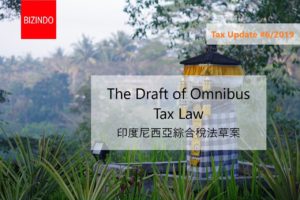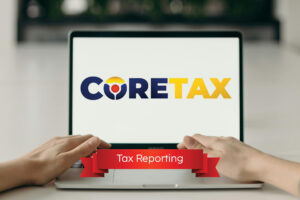On 7 October 2021, the Indonesian parliament passed the “Harmonisation of Tax Regulations” (Harmonisasi Peraturan Perpajakan/HPP) Bill. The enactment of this HPP Bill into Law has been signed by the President on 29 October 2021 marked the enactment this Bill into Law No. 7/2021 (“HPP Law”).
This new law brings a number of changes to existing sections of tax laws (Ketentuan Umum Perpajakan/KUP, Income Tax, Value-Added Tax/VAT, and Excise) whilst also adding new tax law sections on the Voluntary Disclosure Programme/VDP (Program Pengungkapan Sukarela) and Carbon Tax.
Below are some highlights of some major changes proposed by the Bill:
These changes are aimed to be effective starting 2022 Fiscal Year.
Changes in the Income Tax rates:
- Individual Income Tax rates
The HPP Law shifts the cut-off for the first taxable income layer from Rp 50
million to Rp 60 million and adds a new top marginal tax rate of 35% for taxable income above Rp 5 billion. The applicable layers and rates will then be as follows:
Taxable Income Tax Rate ≤ 60 million 5% > 60 million – ≤ 250 million 15% > 250 million – ≤ 500 million 25% > 500 million – ≤ 5 billion 30% > 5 billion 35% - Corporate Income Tax (CIT) rate for 2022 onwards
This HPP Law stipulates that the CIT rate will remain 22% instead of being reduced to 20% from 2022 Fiscal Year. Accordingly, it revokes the provisions in Article 5(1)(b) of Law No.2 Year 2020.
Changes related to transfer pricing on related party transactions:
The elucidation of Article 18 of the HPP Law elaborates that the Government is authorised to prevent tax avoidance practices by taxpayers. Examples given on these practices are:
- performing transactions that are not based on the actual conditions and not inline with the substance over forms principle.
- reporting profits that are too low compared to the financial performance of
other taxpayers in similar business. - reporting unreasonable losses although the company has been in commercial
operation for more than five years.
For companies falling into the categories in the last two bullet points above, the DGT can benchmark against comparable companies to calculate the tax that should be due.
Non-taxable threshold for certain individual taxpayers:
The HPP Law adds a new provision which provides a threshold of non-taxable gross turnover of Rp 500 million in a fiscal year for individuals with certain gross turnover which are subject to final tax.
Final Tax:
Interest of several financial instruments has been subject to final tax under the existing ITL. The HPP Law now adds interest or discount on short-term securities traded on the money market as one of the tax objects under the final tax regime.
New rules on Benefits-in-Kind:
Under the existing ITL, certain BIK were non-taxable to employees, whilst being
non-deductible to companies for CIT purposes. The HPP Law has eliminated this,
so that BIK is generally taxable with some limited exceptions as follows:
- Food and beverages provided for all employees;
- BIK in certain areas;
- BIK necessary to carry out work;
- BIK sourced or financed by the regional/state revenue budget; or
- Certain types of BIKs with certain threshold.
On the other hand, certain BIKs previously non-deductible (because they were non-taxable to employees) will now be deductible for CIT purposes. The types of
BIKs which are non-taxable to employees and which are deductible for CIT will be further regulated through a Government Regulation.
Changes related to several types of tax deductions:
- Bad debt provisions for financial services companies
The HPP Law modifies the requirement for deductible bad debt provision for financial services companies. Under this Law, the bad debt provisions for financial services companies should be calculated based on the applicable accounting standards with certain limits after coordinating with Financial Services Authority (Otoritas Jasa Keuangan). - Useful lives for permanent buildings and intangible assets
If a permanent building or an intangible asset has a useful life of more than 20 years, the depreciation or amortisation can be carried out using the straightline method using a 20-year period or the actual useful life based on taxpayer’s bookkeeping. - Expansion of methods for limitation on interest deduction
Under the existing Law, the methods to limit the interest deduction is using a Debt-to-Equity Ratio method. The HPP Law now expanded the acceptable method to other methods commonly used internationally such as using Percentage of EBITDA (Earning Before Interest, Taxes, Depreciation, and Amortisation).
On a positive note, the HPP Law lowers the administrative sanctions on taxpayer’s wrongdoing, in particular when a taxpayers’ Tax Objection or Tax Appeal is rejected or only partially approved.
Changes in the administrative sanctions:
No. Clause Sanction refer to KUP Law Sanction refer to HPP Law
1
Administrative sanction for an Underpaid Tax
Assessment Letter (Surat Ketetapan
Pajak Kurang Bayar/SKPKB) issued relating
to an unreported tax return, invalid VAT
compensation or invalid use of 0% VAT, or a
failure to comply with bookkeeping
requirements:
a. Unpaid/underpaid Income Tax in a fiscal year
50% Increment
(MIR+20%)/12 max. 24 months
b. Income Tax not withheld/collected or under withheld/collected
100% Increment
(MIR+20%)/12 max. 24 months
c. Income Tax witheld/collected but unremitted/under remitted
100% Increment
75% Increment
d. Unpaid/underpaid VAT
100% Increment
75% Increment
2
Penalty if a taxpayer objection is rejected or partially approved
50%
30%
3
Penalty if a taxpayer appeal is rejected or partially approved
100%
60%
Changes related to taxpayers’ rights and obligations:
No. Conditions KUP Law HPP Law
1
Tax ID Number
–
The HPP Law stipulates that the Indonesian resident number (Nomor Induk Kependudukan) will henceforth be used as the Tax ID Number (Nomor Pokok Wajib Pajak/NPWP) for individual taxpayers. This is to support the implementation of single identity number for Indonesian residents.
2
Taxpayer’s proxy
Under the existing KUP Law taxpayers can appoint a proxy who holds appropriate “tax competency”.
Under the HPP Law the competency requirement is not required if the proxy is to a spouse or family member by blood or marriage up to the second degree.
3
Voluntary Disclosure (Pengungkapan Ketidakbenaran)
This deals with taxpayers making a “Voluntary Disclosure” to the Directorate
General of Taxes (DGT) after the start of a tax audit.
Under the HPP Law the Voluntary Disclosure can be made prior to the issuance of the Tax Audit Result (Surat Pemberitahuan Hasil Pemeriksaan) instead of prior to the issuance of the Tax Assessment Letter (Surat Ketetapan Pajak/SKP) as per the existing KUP Law.
4
Appointment of other parties as tax withholders/collectors
–
The HPP Law authorises the DGT to appoint “other parties” as tax
withholders/collectors. Other parties are those who are directly “related” or act
as a “facilitator” on a relevant transaction.
Changes related to tax dispute resolution process:
- Provisions related to a Judicial Review process
The HPP Law provides new provisions related to the Judicial Review process which had not been governed under the existing KUP Law. The new provisions stipulate that:
– if a taxpayer or the DGT file for a Judicial Review at the Supreme Court, this filing will not defer or cease the implementation of the Tax Court Decision.
– the tax underpayment resulting from a Judicial Review Decision will be subject to a 60% penalty to be collected through a Tax Collection Letter (Surat Tagihan Pajak/STP) within two years of the Judicial Review Decision being received by the DGT. - Mutual Agreement Procedure (MAP)
The HPP Law emphasises that, if a MAP process has not reached agreement by the time of the announcement of a Tax Court or Judicial Review Decision, then the DGT can:
– continue negotiations if the content of the Decision is not related to the MAP case; or
– use the Decision during MAP negotiations or propose the cessation of negotiations, if the content of the decision is related to the MAP case.
The most significant VAT change under the new Bill is the proposed increase in the VAT rate to 11% from 1 April 2022 and 12% from 1 January 2025.
The status of some of the current non-VATable objects are changed to become either VATable objects, non-VATable objects with certain requirements, or VATable objects with an exemption facility under strategic goods/services. In addition, several goods/services are also removed from the strategic goods/services category.
Changes in the status of several non-VATable objects:
Below is a list of currently non-VATable goods/services which will:
- become VATable goods/services
• Mining or drilling products taken directly from the source;
• Postal services;
• Gold bars other than for the Government’s forex reserve;
• Public phone services;
• Non-advertisement broadcasting services;
• Money transfer by postal services. - remain as non-VATable goods/services but with certain new requirements
• Food and beverages served in hotels/restaurants, etc. that are subject to Regional Tax;
• Hotel, parking, catering, art and entertainment services that are subject to Regional Tax;
• Services provided by the Government which cannot be provided by other parties. - become VATable strategic goods/services but with exemption facilities
• Basic necessity products that are highly needed by the public;
• Medical services under the national health insurance programme;
• Financial services;
• Insurance services;
• Educational services;
• Social services which are not profit-based;
• Public transportation services;
• Labour services.
Changes in the scope of purpose of strategic goods/services:
The HPP Law removes several categories from strategic goods/services including:
- affordable houses for low-income households;
- clean water;
- electricity.
In addition the HPP Law adds industrial downstream and goods/services needed for non-natural disaster, to the category of strategic goods/services.
Changes in crediting Input VAT:
The HPP Law provides confirmation and changes to the treatment of crediting Input VAT as follows:
• Confirmation that Input VAT on the acquisition of goods/services using an “other value” methodology as the VAT imposition base can be credited by the buyer.
• That Input VAT relating to the purchase of motor vehicles in the form of sedans and station wagons (not for trade or rental) is removed from the list of non-creditable Input VAT.
• More elaboration on crediting Input VAT under the scenario where a VATable Entrepreneur (Pengusaha Kena Pajak/PKP) has both VATable and nonVATable deliveries.
VAT treatment for a PKP with certain turnover thresholds and certain business fields:
In the existing VAT Law a PKP falling within a specified turnover threshold and certain business activities must use the Calculation Norm to calculate Input VAT. This provision is deleted under the HPP Law. The HPP Law instead provides that these categories of PKPs can collect and pay Output VAT based upon an amount stipulated by the MoF. The Input VAT under this scheme cannot be credited by the buyer.
The HPP Law expands on the previous Tax Amnesty (TA) programme through a new VDP. There are two VDP programmes under the HPP Law, as follows:
- VDP I – applicable for taxpayers who already participated in the 2016-2017
TA programme, for assets acquired from 1985-2015. - VDP II – applicable for individuals, for assets acquired from 2016-2020
VDP I:
Scope:
The VDP I programme will run during the period of 1 January – 30 June 2022. As mentioned, this programme is for taxpayers who participated in the previous TA programme. It provides them with another opportunity to disclose assets acquired from 1 January 1985 – 31 December 2015 which were not previously disclosed under the TA programme.
Tax rates:
The newly disclosed assets are deemed as income and subject to Final Income Tax based on the net assets value using the following percentage:
Type / Rate Final Tax Failure to reinvest/repatriate and assessed through issuance of SKPKB Failure to reinvest/repatriate and voluntarily paid by the taxpayer
Declaration on assets located in Indonesia if invested in eligible investment
6%
4.5%
3%
Declaration on assets located in Indonesia but not invested in eligible investment
8%
–
–
Declaration on assets located outside Indonesia if:
1. repatriated into Indonesia; and
2. invested in eligible investment
6%
if fail to reinvest: 4.5%, if fail to do both: 7.5%
if fail to reinvest: 3%, if fail to do both: 6%
Declaration on assets located outside Indonesia if:
1. repatriated into Indonesia; and
2. not invested in eligible investment
8%
fail to repatriate: 5.5%
fail to repatriate: 4%
Declaration on assets located outside Indonesia and not repatriated into Indonesia
11%
–
–
Asset repatriation and investment:
Assets declared can be in any form and can be domestic or offshore assets. However, lower rates may be applicable if the assets are invested in certain eligible investments and/or if the offshore assets are repatriated into Indonesia.
To enjoy the lower rates, the deadline for offshore assets to be repatriated into Indonesia is 30 September 2022.
The eligible investment to enjoy the lower rates are as follows:
- Business activity in processing of natural resources (e.g. processing of gold ore to pure gold) or renewable energy (e.g. solar energy) in Indonesia; and/or
- Government Debt Securities (Surat Berharga Negara/SBN).
These eligible investments must be placed by 30 September 2023 at the latest and must be retained for a minimum of five years after the investment date.
Failure to repatriate the offshore assets, or failure to invest the assets in eligible investments within the prescribed periods will result in additional Final Income Tax for 2022 Fiscal Year using the tax rates stated in the above table.
Incentives:
The following incentives are applicable for taxpayers who have received an SK:
- Taxpayer will not be subject to administrative sanction under Article 18(3) of TA Law (i.e. 200% penalty); and
- Data and information declared in SPPH cannot be used as a basis for tax investigation and/or criminal prosecution.
VDP II:
Scope:
The VDP II programme will also run during the period of 1 January – 30 June 2022. VDP II is only available to individual taxpayers and only relates to assets acquired from 1 January 2016 – 31 December 2020 which have not been disclosed in the 2020 Annual Income Tax Return (AITR) and are still owned by the taxpayer at end of 2020 Fiscal Year.
Tax rates:
Type / Rate Final Tax Failure to reinvest/repatriate and assessed through issuance of SKPKB Failure to reinvest/repatriate and voluntarily paid by the taxpayer
Declaration on assets located in Indonesia if invested in eligible investment
6%
4.5%
3%
Declaration on assets located in Indonesia but not invested in eligible investment
8%
–
–
Declaration on assets located outside Indonesia if:
1. repatriated into Indonesia; and
2. invested in eligible investment
6%
if fail to reinvest: 4.5%, if fail to do both: 7.5%
if fail to reinvest: 3%, if fail to do both: 6%
Declaration on assets located outside Indonesia if:
1. repatriated into Indonesia; and
2. not invested in eligible investment
8%
fail to repatriate: 5.5%
fail to repatriate: 4%
Declaration on assets located outside Indonesia and not repatriated into Indonesia
11%
–
–
Asset repatriation and reinvestment:
The deadlines for offshore assets to be repatriated and placed in eligible investments are the same as in the VDP I programme, i.e. 30 September 2022 and 30 September 2023, respectively. The required holding period for the eligible investment is also five years from the investment date. The types of eligible investment to enjoy the lower rates are also the same as in the VDP I programme.
However, the Final Tax rates applicable upon failure to repatriate assets and/or place in eligible investments are slightly different as stated in the table above VDP II ‒ Tax Rate section.
Incentives:
The following incentives are applicable for taxpayers who have received an SK:
- No tax assessment will be issued for 2016 – 2020 Fiscal Year unless there is a new data or information on assets that have not been disclosed in the SPPH; and
- Data and information declared in SPPH cannot be used as a basis for tax
investigation and/or criminal prosecution.
Undisclosed assets under point (a) above will be deemed as income for 2022 Fiscal Year and subject to Final Income Tax of 30% plus administrative sanction under Article 13(2) of KUP Law that will be collected via an SKPKB.
The Carbon Tax is a new provision introduced in the HPP Law which is to be effective from 1 April 2022.
Tax object:
Carbon Tax is to be imposed on “carbon emissions” which have a negative impact on the environment. The “carbon emissions” that are subject to Carbon Tax may be added to/expanded through the issuance of a GR (after being agreed with Parliament in the context of the Annual State Budget proposal). This may lead to a question on whether the scope of the Carbon Tax could then be revisited every year.
Tax subjects:
Individuals or companies purchasing goods containing carbon or carrying-out activities which result in a certain level of carbon emissions within a certain period are the parties subject to the Carbon Tax.
The HPP Law broadly stipulates that a Carbon Tax subject can be either a carbon purchaser or a carbon emitter with clarity to be provided in a GR (subject to agreement by the Parliament). The elucidation already determines the first tax subjects to be power plant companies (i.e. carbon emitters). The elucidation also emphasises that the imposition of this tax shall be prioritised towards corporate tax subjects (instead of individuals).
Tax rate and taxable event:
The rate of Carbon Tax shall at least be the carbon price in the domestic carbon
market per kg CO2e.
However, based on the HPP Law, the above rate shall not be less than Rp 30/kg CO2e. This base rate can also be revisited through the issuance of an MoF Regulation (after consultation with Parliament). This appears to mean that, once the carbon market in Indonesia is established,
the Carbon Tax rate will follow the market price but with an Rp 30/kg CO2e floor (being the current minimum price).
The Carbon Tax is due:
- upon the purchase of goods containing carbon;
- at end of each calendar year (i.e. December) during which the carbon emitting activity is carried out; or
- per other timing as determined by a GR.
Effective date:
The implementation of Carbon Tax will be in stages according to market readiness with the earliest stage to be on 1 April 2022 for coal-fired power plant companies.
The HPP Law adds electronic cigarette as one of the tobacco products subject to excise. It also provides that future additions or reductions of types of excisable goods shall be regulated by a GR after being discussed and agreed during the preparation of the State Revenue and Expenditure Budget Draft.
The HPP Law also provides an avenue to stop an ongoing dispute process for violations related to permits, release of excisable goods, excisable goods not being packaged, excisable goods originating from criminal acts, and the sale and purchase of excise tapes. The implication will be different depending on the stage of the dispute process as follows:
- If the violation is still under an examination process, the case will not be escalated to the investigation process if the taxpayer pays the administrative sanctions of three times the excise value that should be paid.
- If the violation is already under an investigation process, the Attorney General can terminate the investigation process if the taxpayer pays the administrative sanctions of four times the excise value that should be paid (previously taxpayer must pay the unpaid/underpaid excise plus the four times penalty).





 20% off today. Whatsapp us!
20% off today. Whatsapp us!